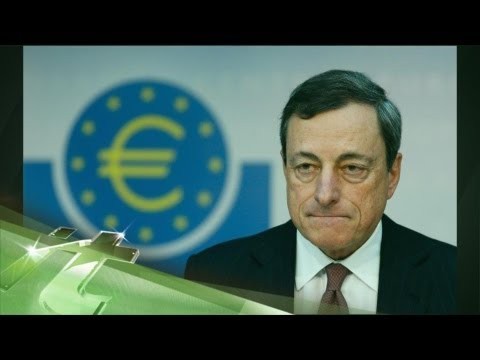The Fed to Europe’s Rescue
Post on: 5 Июль, 2015 No Comment

Published November 28, 2011
Whether Germany’s Angela Merkel decides to be Germany’s new Iron Chancellor or Merkel in the Middle may be beside the point, as the bond markets continue to deliver a negative verdict on the Eurozone crisis, with EU yields sticking stubbornly high and borrowing costs soaring.    
Because it could take months more for either Germany’s Merkel or France’s Nicolas Sarkozy to get the 17 members of the euro zone to agree on measures to save the eurozone, as the markets now threaten a rapid loss of faith in Italy, Spain and France within the span of the next several weeks.
Another European summit could render a deal on December 9, the next scheduled meeting, but for the markets that may be “a day late, a euro short.”
Will the Federal Reserve step in once again, as it has done in the past, to help? Will it do so, along with a coalition of the willing — meaning other central banks — as has been suggested? Will it revive and increase a 2008 rescue measure, dollar liquidity swaps to the European Central Bank. That is, literally print money — which will make Texas Congressman Ron Paul ’s head explode.
In fact, the Fed has kept open its dollar swap lines, renewing them in June until August 2012. The way it works is thus: the ECB, for example, sells a slug of its euros to the Federal Reserve in exchange for dollars — the foreign central bank then doles that money out to banks, and agrees to repurchase its own currency, with interest, on a specified future date.
The ECB in fact has drawn on the Fed’s dollar swap line since August, at least $1.8 billion since then, to lend to European banks. The ECB to date has not named the banks or institutions getting these dollars. At the height of the financial crisis, the Fed’s outstanding dollar swaps hit $586 billion by the end of 2008, according to the Government Accountability Office .
Or will the U.S. central bank simply buy European sovereign bonds, which Fed chairman Ben Bernanke has said he is leery about doing due to the deleterious effect on the dollar?
Already, central bankers around the world are in their “lenders of last resort” mode. The Bank of Japan. the Swiss National Bank, and the Bank of England are just the latest of central banks embarking on more quantitative easing, “with the Fed likely to follow in a few weeks,” forecasts Peter Boockvar of Miller Tabak.
JPMorgan Chase says the Bank of England, and the ECB, as well as nine other countries, have ginned up monetary stimulus in the past three months, the highest number of banks easing up on credit since the third quarter of 2009, when 15 central banks around the world slashed rates.
A half dozen more countries, including Mexico and Sweden, may cut benchmark rates by the end of the first quarter of 2012, JPMorgan Chase says.
All this means countries around the world will start piling up the currency sandbags, as devaluation sets in.
Boockvar notes that while the stock markets like quantitative easing, or central bank bond buying, such purchases really paint a picture, they are really “just an illusion.” For instance, he says: “the FTSE stock market in gold terms priced in pounds (non-debased currency terms) is below its March 2009 lows.”
At the same time, the International Monetary Fund now says Italy and Spain have not asked for its help. Perhaps it’s because the IMF’s strict lending terms may cause countries to balk.
IMF loans historically are senior to sovereign debt, which could cause future bond investors to walk and not lend a country any new money in the future. Why should they, if they get shoved to the back of the line?
Also, the IMF could theoretically stop a country that gets its loans from issuing new debt, as it demands fiscal reforms. Which is why market expert Jim Grant has it right, to paraphrase: “Government bonds are now return-free risk versus risk-free return.”
Many American money market funds have slashed their exposure to European banks by 42% since last May, says Fitch Ratings.
At the same time, European banks continue to get stung in trading, their shares continue to trade well below their asset values, at about a third or 40%, meaning investors expect their balance sheets will be hit with big write downs in the future.

That means European banks may need to borrow big, as European sovereign debt weighs like blacksmith anvils on their balance sheets, and as Italy needs to roll over an estimated $479 billion in debt next year. Italy has $2.6 trillion in debt, 65 million people, and zero to no growth over the last decade.
Also, France fears it may lose its triple-A status, at a time when the assets at France’s top five banks are three times the size of the French economy. A downgrade would really hurt, because any EU rescue fund needs to be backed by France’s triple A, along with Germany’s top notch rating.
European banks may need U.S. dollars to use as collateral in order to borrow at the European Central Bank lending window. Euro zone banks may need to engage in liquidity swaps to get the right kind of collateral to satisfy the ECB.
There was lots of buzz about a piece in England’s Daily Telegraph discussing the Fed buying euro zone bonds. The story quotes Federal Reserve chairman Ben Bernanke’s speech in November 2002 – “Deflation: Making sure ‘it’ doesn’t happen here” – considered to be a policy road map.
Fed chairman Bernanke said at the time: “The Fed can inject money into the economy in still other ways. For example, the Fed has the authority to buy foreign government debt, as well as domestic government debt. Potentially, this class of assets offers huge scope for Fed operations, as the quantity of foreign assets eligible for purchase by the Fed is several times the stock of U.S. government debt.”
But what the Daily Telegraph didn’t note was what Bernanke said next—he remains wary of this move: “I need to tread carefully here..Fed purchases of the liabilities of foreign governments have the potential to affect a number of financial markets, including the market for foreign exchange.”
Bernanke added: “Since the United States is a large, relatively closed economy, manipulating the exchange value of the dollar would not be a particularly desirable way to fight domestic deflation, particularly given the range of other options available.”
Elizabeth MacDonald joined FOX Business Network (FBN) as stocks editor in September 2007 and is the author of Skirting Heresy: The Life and Times of Margery Kempe (Franciscan Media, June 2014).
Follow Elizabeth MacDonald on Twitter @LizMacDonaldFOX .
+ Follow Fox Business on Facebook














